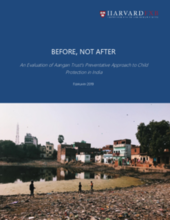This research seeks to develop a deeper understanding of community strategies for preventing serious violations of children’s rights before they occur. Most interventions intended to protect children are currently designed to begin after harm has occurred: remove children from places of exploitation, then attempt to support their recovery and social integration. But the prevention of structural, physical, sexual and emotional violence against children is an emerging global policy priority, and advocates are increasingly focused on “systems strengthening” approaches that seek to improve holistic overall functioning of child protection systems.
Little rigorous research exists that unpacks how preventative strategies can be implemented at the local level, or that assesses their impact for service providers, caregivers, and vulnerable children. This study documents and evaluates the harm prevention work carried out by the children’s rights nonprofit Aangan Trust since late 2015 in Konia, a peri-urban slum area in Varanasi, a large city in the Indian state of Uttar Pradesh.
Results show that community-level harm prevention work involves considerable challenges, especially in a context where structural factors militate against child wellbeing. This study highlights a crucial need for more efficient and robust investments in education, social protection, economic development and legal enforcement. However, the study also finds compelling evidence of improved service provider performance and of children who, as a result of Aangan’s program, had their marriages delayed, avoided being trafficked, or were signed up for school. The fact that Aangan achieved this progress in little over two years, on issues that are structurally and historically entrenched, is remarkable.
This study aims to provide an evidence-based case for accelerated investments in prevention: the program described has a yearly running cost of Rs. 632,204 ($9,482) for each location such as Konia, yet the resulting long-term benefits are significant. They accumulate for the children enabled to develop their potential in relative health and safety, and for the societies to which they belong. This project also seeks to develop a rigorous methodological approach to “prevention science” that will enable further research in this field.

